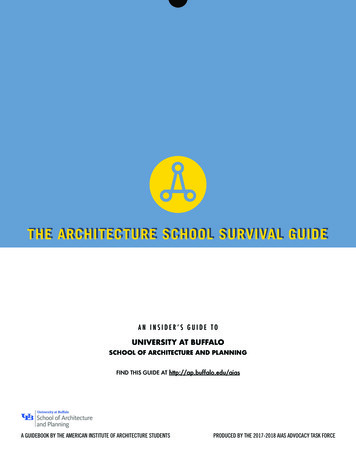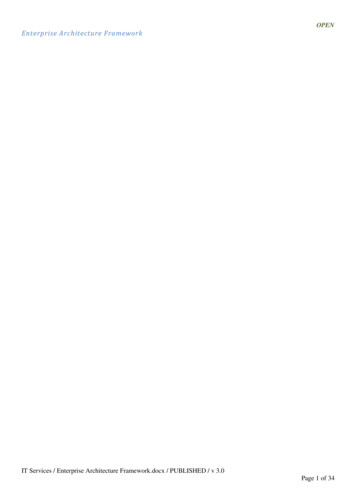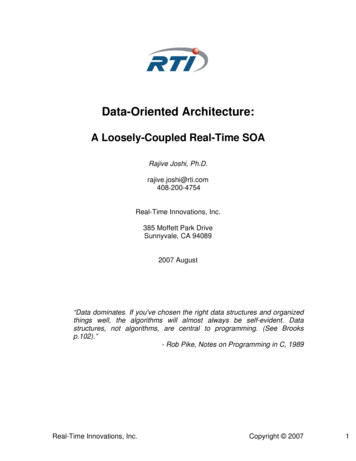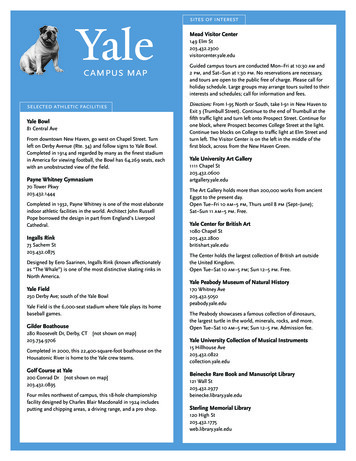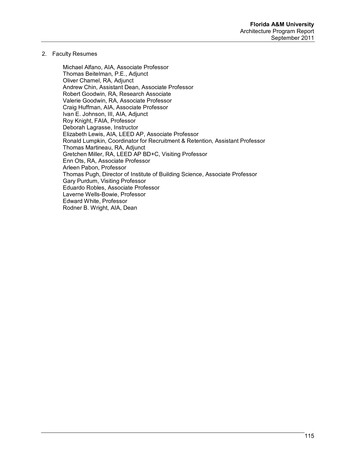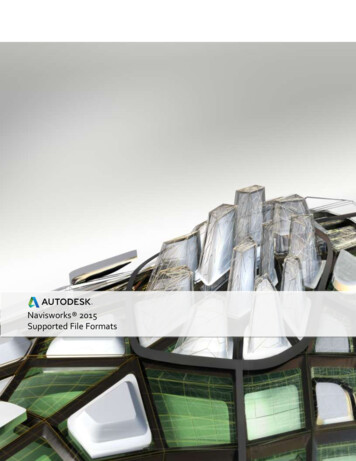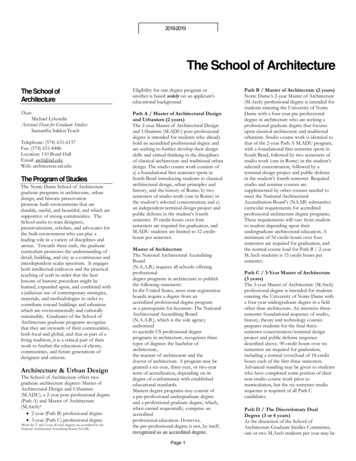
Transcription
2018-2019The School of ArchitectureThe School ofArchitectureEligibility for one degree program oranother is based solely on an applicant'seducational background.Dean:Michael LykoudisAssistant Dean for Graduate Studies:Samantha Salden TeachPath A / Master of Architectural Designand Urbanism (2 years)The 2-year Master of Architectural Designand Urbanism (M.ADU) post-professionaldegree is intended for students who alreadyhold an accredited professional degree andare seeking to further develop their designskills and critical thinking in the disciplinesof classical architecture and traditional urbandesign. The studio course work consists ofa) a foundational first semester spent inSouth Bend introducing students to classicalarchitectural design, urban principles andhistory, and the history of Rome; b) twosemesters of studio work (one in Rome) inthe student’s selected concentration; and c)an independent terminal design project andpublic defense in the student’s fourthsemester. 39 credit-hours over foursemesters are required for graduation, andM.ADU students are limited to 12 credithours per semester.Telephone: (574) 631-6137Fax: (574) 631-8486Location: 110 Bond HallEmail: arch@nd.eduWeb: architecture.nd.eduThe Program of StudiesThe Notre Dame School of Architecturegraduate programs in architecture, urbandesign, and historic preservationpromote built environments that aredurable, useful, and beautiful, and which aresupportive of strong communities. TheSchool seeks to train designers,preservationists, scholars, and advocates forthe built environment who can play aleading role in a variety of disciplines andarenas. Towards these ends, the graduatecurriculum promotes the understanding ofdetail, building, and city as a continuous andinterdependent scalar spectrum. It engagesboth intellectual endeavor and the practicalteaching of craft in order that the bestlessons of historic precedent might belearned, expanded upon, and combined witha judicious use of contemporary strategies,materials, and methodologies in order tocontribute toward buildings and urbanismwhich are environmentally and culturallysustainable. Graduates of the School ofArchitecture graduate programs recognizethat they are stewards of their communities,both local and global, and that as part of aliving tradition, it is a critical part of theirwork to further the education of clients,communities, and future generations ofdesigners and citizens.Architecture & Urban DesignThe School of Architecture offers twograduate architecture degrees: Master ofArchitectural Design and Urbanism(M.ADU), a 2-year post-professional degree(Path A) and Master of Architecture(M.Arch)* 2-year (Path B) professional degree 3-year (Path C) professional degree*Both the 2- and 3-year M.Arch degrees are accredited by theNational Architectural Accrediting Board (NAAB).Master of ArchitectureThe National Architectural AccreditingBoard(N.A.A.B.) requires all schools offeringprofessionaldegree programs in architecture to publishthe following statement:In the United States, most state registrationboards require a degree from anaccredited professional degree programas a prerequisite for licensure. The NationalArchitectural Accrediting Board(N.A.A.B.), which is the sole agencyauthorizedto accredit US professional degreeprograms in architecture, recognizes threetypes of degrees: the bachelor ofarchitecture,the masters of architecture and thedoctor of architecture. A program may begranted a six-year, three-year, or two-yearterm of accreditation, depending on itsdegree of conformance with establishededucational standards.Masters degree programs may consist ofa pre-professional undergraduate degreeand a professional graduate degree, which,when earned sequentially, comprise anaccreditedprofessional education. However,the pre-professional degree is not, by itself,recognized as an accredited degree.Page 1Path B / Master of Architecture (2 years)Notre Dame’s 2-year Master of Architecture(M.Arch) professional degree is intended forstudents entering the University of NotreDame with a four-year pre-professionaldegree in architecture who are seeking aprofessional graduate degree that focusesupon classical architecture and traditionalurbanism. Studio course work is identical tothat of the 2-year Path A M.ADU program,with a foundational first semester spent inSouth Bend, followed by two semesters ofstudio work (one in Rome) in the student’sselected concentration, followed by aterminal design project and public defensein the student’s fourth semester. Requiredstudio and seminar courses aresupplemented by other courses needed tomeet the National ArchitecturalAccreditation Board’s (NAAB) substantivecurricular requirements for accreditedprofessional architecture degree programs.These requirements will vary from studentto student depending upon theirundergraduate architectural education. Aminimum of 54 credit-hours over foursemesters are required for graduation, andthe normal course load for Path B / 2-yearM.Arch students is 15 credit hours persemester.Path C / 3-Year Master of Architecture(3 years)The 3-year Master of Architecture (M.Arch)professional degree is intended for studentsentering the University of Notre Dame witha four-year undergraduate degree in a fieldother than architecture. An intensive threesemester foundational sequence of studio,history, theory and technology coursesprepares students for the final threesemester concentration/terminal designproject and public defense sequencedescribed above. 90 credit hours over sixsemesters are required for graduation,including a normal (over)load of 18-credithours each of the first three semesters.Advanced standing may be given to studentswho have completed some portion of theirnon-studio course work prior tomatriculation, but the six-semester studiosequence is required of all Path Ccandidates.Path D / The Discretionary DualDegree (3 or 4 years)At the discretion of the School ofArchitecture Graduate Studies Committee,one or two M.Arch students per year may be
2018-2019invited to pursue the Discretionary DualDegree (DDD) course of study. Studentswho pursue the DDD option spend anadditional year of studies at Notre Dame,during which time they spend two semestersrather than one in Rome, completeconcentrations in both ClassicalArchitecture and Urban Design, andgraduate at the end of their additional yearwith both the professional M.Arch degreeand the post-professional M.ADU degree.All M.Arch students are eligible to apply forthe DDD course of study, but all DDDinvitations are extended at the discretion ofthe School of Architecture Graduate StudiesCommittee and may vary in number in anyyear from none to no more than two.Exactly twenty-four (24) credits must betaken in the final year of study, twelve (12)each semester.Historic PreservationThe School of Architecture offers a twoyear Master of Science in HistoricPreservation program. It is only natural thata program dedicated to the development ofbuildings and places that are lasting andmeaningful to the communities that inhabitthem provide education in the care for greatexisting buildings and places throughthoughtful preservation practices.Application RequirementsPlease note that while the online applicationsite is hosted by the University of NotreDame Graduate School, all applicationmaterials are processed and evaluated by theGraduate Admissions Committee within theSchool of Architecture.1. An applicant for admission to a degreeprogram must complete all of thefollowing: 1. Complete andelectronically submit the onlineapplication2. Submit a statement of intent throughthe online application system3. Submit a curriculum vitae or resuméthrough the online application system4. Arrange for three (3) letters ofrecommendation to be submittedthrough the online recommendationsystem associated with the onlineapplication5. Submit unofficial transcripts from eachpost-secondary institution through theonline application6. Submit a portfolio of work in hardcopy form to the School ofArchitecture. It is requested thatportfolios have a maximum size of 11X 14 inches.7. Submit the application fee by creditcard, check, or money order using thepayment system associated with theonline application system8. Arrange for the submission of officialGraduate Record Examination (GRE)General Test scores9. Arrange for submission of official Testof English as a Foreign Language(TOEFL) or International EnglishLanguage Testing System (IELTS)scores if the applicant’s native languageor language of college instruction is notEnglishThe online application may be accessedthrough the Graduate School’s website athttp://graduateschool.nd.edu.Students who have preliminary test scoresare encouraged to upload them to theapplication to expedite the review process.The Graduate Record Examination (GRE)is offered at sites in the United States andabroad. The annual schedules and otherinformation about the GRE can be obtainedonline at http:// www.gre.org or fromEducational Testing Service (ETS),Graduate Record Examination, Box 6000,Princeton, NJ 08541-6000, USA. If youneed to call about the GRE, telephone theEducational Testing Service at (609) 7717670. The Test of English as a ForeignPage 2Language (TOEFL) and the InternationalEnglish Language Testing System (IELTS)are offered several times each year at sites inthe United States and abroad. Internationalstudents, except those whose nativelanguage or language of college instruction isEnglish, must submit TOEFL or IELTSscores as part of their application todemonstrate a sufficient command ofEnglish to meet the requirements of theirfield. If not available locally, the annualschedules and other information about theTOEFL can be obtained online athttp://www.toefl.org or from EducationalTesting Service (ETS), TOEFL, Box 6151,Princeton, NJ 08541-6151, USA. If youneed to call about the TOEFL, telephonethe Educational Testing Service at (609)771-7100. Information on the IELTS can beobtained online at http://ielts.orgStudents seeking admission to more thanone program must submit separateapplications for each program. Theapplication fee must accompany theapplication. This fee is nonrefundable, andmay be paid by check, money order, orcredit card (see online application for thecurrent application fee). The applicationdeadline is January 15th for admission to thefollowing fall semester. The School ofArchitecture does not allow for Springenrollment.Transcript Review for ProfessionalDegree StudentsStudents entering (the 2-year M.ADUprogram) with a previous professionaldegree have completed the educationalrequirements necessary to test for licensurein the U.S. or in another jurisdiction ascertified by another institution.Students entering the 3-year professionaldegree program do not have a previousdegree in architecture and therefore are notassumed to have any previous courseworkexperience that would fulfill courserequirements within the School ofArchitecture's curriculum. However, thesestudents are welcome to apply for advancedstanding in one or more courses.Students entering the 2-year professionaldegree program have already completed aportion of the educational requirementsnecessary to test for licensure. As theUniversity of Notre Dame School ofArchitecture will certify the professionaldegree for these students, careful review ofthe student's previous transcripts is critical.All applicants must include a final transcriptfrom all previous institutions with theirapplication (or their latest transcript to beupdated with their final one immediatelyafter graduation before enrolling in the
2018-2019University of Notre Dame School ofArchitecture's graduate program). TheAssistant Dean of Graduate Studies reviewseach transcript in detail comparing them tothe three-year professional degreecurriculum and ensuring that a minimum of26 credits of studio work have already beenfulfilled (as the 24 credits within the 2-yearprofessional degree program will completethe NAAB's required minimum of 50credits). Syllabi for various courses may berequested from the student wherever aquestion may arise and faculty members maybe called on to assist in their review. Anyseminar or lecture courses whose contentshave not already been covered (ArchitecturalHistory, Building Technology, Structures,Environmental Systems, ProfessionalPractice, etc.) will be added to the student'srequired curriculum. Several slots have beenidentified for that purpose in the curriculumoutline. Any of these slots not needed foradditional required coursework may be usedfor elective courses of the student'schoice. Students requiring more coursesthan slots provided may be required to takemore than the maximum course load givenin a given semester and, if a course is notavailable in the semester needed, to take thecourse in an independent study format,depending on the availability of theinstructor.Advanced StandingStudents seeking advanced standing areasked to identify the lecture or seminarcourse(s) in question and provide thecorresponding syllabus or syllabi from theirundergraduate or previous graduate work tothe Assistant Dean of GraduateStudies. The ADGS will then review thedocuments with the appropriate instructorsto determine whether the previouscoursework does indeed fulfill therequirements of one or more courses in thecurriculum. Advanced standing may beawarded to students who have completedsome portion of their non-studio coursework prior to admission, but the four- orsix-semester studio sequence is required ofall students. Students awarded advancedstanding will not receive University of NotreDame credit for the courses in question, butwill simply have the corresponding numberof credits deducted from their degreeprogram minimum requirement. A studentmay then simply have a lighter course loadfor a given semester or have the opportunityto take additional elective courses. Studentsopting for a lighter course load in a givensemester should ensure that their number ofcredits still meets the minimumrequirements for full-time student status,their student loans, etc.Degree RequirementsTuition and ExpensesAs described above, degree requirementsinclude various studio and theory courses inPaths A, B and C; as well as various ancillaryhistory and technology courses for Paths Band C. Minimum credit hour requirementsfor Paths A, B, C, the dual degree, and theMSHP are indicated below, as well as theanticipated time to complete them:Please note: The following tuition, fees,housing, and living costs are for theacademic year 2018-2019. Annual increasesin costs should be anticipated.TuitionThe tuition for the academic year 2018–2019is 52,746.Path A: M.ADU39 credit hours (48 max); 2 yearsSummer Introductory Session tuition 1,200Path B: M.Arch54 credit hours; 2yearsPath C: M.Arch90 credit hours; 3 yearsDual M.Arch/M.ADU114 credit hours; 3-4 yearsMSHP55 credit hours; 2 yearsFinancial InformationThe Notre Dame School of Architecturerecognizes that electing to attend graduateschool is a major commitment for students(and their families) in terms of work, time,and finances and seeks to mitigate theimpact that tuition and other expensesmight have.All graduate students are eligible forfinancial support during the regularacademic year and while progressingthrough the curriculum in a normativesequence in accordance with the conditionsof the Graduate Student Handbook,provided to students upon arrival andavailable on the School of cation for scholarships is understoodto be integral to the program applicationand no additional scholarship application isrequired. Students will be informed aboutscholarship financial support, and stipendsas appropriate, upon acceptance to theprogram.Student loans and other non-scholarshipfinancial support is administered throughthe Office of Financial Aid. Questionsabout loan requirements, applicationdeadlines and additional information shouldbe directed to the Office of Financial Aid.Page 3Summer courses between academic years may be of interest to somegraduate students as electives. Scholarships from the School ofArchitecture do not apply to these summer courses and so tuitionwould be based on a per credit rate, 775 per credit hour (Summer2018).M.ADU post-professional (Path A) studentsreceive financial support in the form ofstipends and full-tuition scholarshipsthrough teaching assistant positions andfellowships. Requirements for M.ADUstudents receiving stipends are comprised ofthree semesters—the three semesters spentin South Bend—serving as teachingassistants with additional office/programsupport duties required on an as-neededbasis during the Rome semester. (As ateaching assistant, a student is expected toattend all class meetings and, depending onthe nature of the course, will be asked tolead discussion groups or study sessions,assist with grading, and/or provide studiodesk crits.)Professional degree (M.Arch) and HistoricPreservation (MSHP) students are eligiblefor financial aid in the form of partial tuitionscholarships, student loans and workstudy. Three-year M.Arch (Path C) studentsare not permitted to have work study jobsduring their first semester in the program,though they may be approved on anindividual basis by the Assistant Dean ofGraduate Studies in subsequentterms. When opportunities arise, Path Band Path C students after their first semestermay have an opportunity to serve asteaching assistants.Academic Year Fees Technology Fee: 250* Health Center Access Fee: 150** Graduate Student Activity Fee: 65**** The technology fee provides partial funding for the University’senterprise-wide technology infrastructure, which provides all studentsaccess to the Internet, e-mail, course ware, campus clusters, ResNet,and a wide array of the latest software. This fee provides for thegrowth in student services, such as course and degree requirements,Web Registration, and value-added Internet-related capabilities.** The health center access fee provides students access to all servicesat the University Health Center and University Counseling Center,including 24-hour medical care and counseling/mental healthassistance, and alcohol and drug education programs, as well ashealth education and wellness programs.
2018-2019*** The graduate student activity fee is the responsibility of thestudent. This fee, charged in the fall to all graduate students, coversthe cost of graduate student activities, including but not limited tolectures/seminars, graduate student officer resesarch funds, andoffice overhead. The fee also funds a competitive award thatpartially reimburses expenses graduate students incur during travelto conferences and meetings to present work conducted in thestudents’ major fields of study.Health InsuranceAll students enrolled at the University ofNotre Dame are required to provide proofof insurance (which is valid for care locally)or to purchase the University-sponsoredhealth insurance plan for the entirety oftheir time at the University.The School of Architecture provides asubsidy of the health insurance premiumcost for full-time, post-professional degreestudents who purchase the Universityplan. For the 2017–18 academic year, thestandard subsidy will cover the full studentpremium.Professional degree graduate students whowish to purchase the University plan canexpect to pay 2,265 (2017-2018) per year.First-semester incoming graduate studentswill be billed for insurance at the beginningof the summer workshop, increasing theannual insurance premium to 2,352.00(2017-2018).Additional information on the plan and thecost for spouses and dependents can befound on the University HealthServices website.Books & SuppliesBook and supply costs vary significantlyfrom one student to the next based on theirbackground and therefore what suppliesthey might already have as well as whichcourse of study they will be engaged in-andhow many technical courses they will needto take. A typical three-year preprofessional student in their first year mightexpect to purchase approximately 800 inrequired texts while someone withsignificantly fewer technical courses mightrequire 200-300 in books. Note: Required texts forall courses are held on reserve shelves in the Architecture Libraryfor student use.Those students who are beginning their firstarchitectural study might expect an initialone-time purchase of 1000 for tools andsupplies which can be used throughout theacademic program and beyond inprofessional practice. Faculty make an effortto help prioritize the supply list so thatstudents might budget more effectively; andthe School offers the opportunity topurchase some of the larger-scale itemsthrough the School's website at a smalldiscount—and to ease the issue oftransport. Renewable items such as paper,pencil lead, etc. might expect to cost 150per academic year, depending on the natureof the studio courses in a particular year. Per diem for meals (to make up thePrinting and PlottingA print quota is set for all graduate studentson campus for "regular" printing on 8.5x11"and 11x17" sheet sizes of 35 per semester(at a rate of .02 per B&W page and .12 percolor page). Students may add to their printquota through the Office of InformationTechnologies. Access to plotters and largescale scanners is free of charge for all Schoolof Architecture students. A laser cutter isavailable for course-related projects at nocharge; for personal projects, there is a feeof 5 per 10 minutes of laser time. 3-Dmodel printing may be arranged through theSchool of Architecture Library at a cost of 0.25/gram.HousingHousing costs vary greatly from one studentto another depending on whether they electto live alone or to seek roommates, whetherthey choose to rent a house, to rent anapartment, or to seek on-campus housing,etc. Housing costs (without utilities) can beexpected to range from 250 to 1000 permonth. For more information on oncampus housing visit the Office of Housing.The School of Architecture reimbursesgraduating graduate students for the printingcosts of the three copies of thesis books(with some limitations).Rome & Other AcademicTravelThe majority of costs associated with therequired semester abroad in Rome and withother travel for coursework (domestic andinternational) are covered by theSchool. These costs include: Round trip group airfare from a selectedcity on the U.S. Eastern seaboard toRome (1 ticket)o Students travelling to Rome with spouses andchildren must cover the additional ticketsrequired. Food stipend in Rome (to make up thetypical difference between South Bendand Rome). These funds are depositeddirectly into the student's American bankaccount each month. Housing costs. These costs are fullycovered and housing is arranged by theSchool for students travelling without afamily. An equivalent amount of funds isdirectly deposited in the bank account ofany married student who elects to bringtheir spouse and/or children toRome. Assistance is offered to allmarried students in arranging their Romeapartment rental. Train and bus fare for field trips (Spousesand children of students are not allowed toparticipate in field trips due to liability issues.) Museum entrance fees for field tripsPage 4typical difference between South Bendand the city in question)South Bend/Campus LivingExpensesFoodLike housing, food expenditures can varysignificantly from one student to anotherdepending on how much an individualprefers to eat out, cook at home, or use thedining halls and other on-campusfacilities. While architecture grad studentsdo generally find it least expensive to cookat home and bring meals to campus, manystudents do choose to participate in a mealplan through Notre Dame Food Services forat least a portion of their time oncampus. Meal plans are highly customizableand information can be found at CampusDining.Office of Student AccountsTelephone: (574) 631-7113E-mail: stdacct@nd.eduWeb: http://studentaccounts.nd.eduTuition and fees, as well as any requireddeposits, are payable in advance at thebeginning of each semester. Please note thatNotre Dame does not accept credit cardsfor payment of tuition and fees. Tuitionand/or fees not covered by scholarship arethe responsibility of the student.A student may not register for a newsemester or receive transcripts, certificates,diploma, or any information regarding his orher academic record until the account hasbeen settled in full.Office of Financial AidTelephone: (574) 631-6436E-mail: finaidgr@nd.eduWeb: http://financialaid.nd.eduThe Office of Financial Aid, located in 115Main Building, administers federal andprivate financial aid programs to assist in thefinancing of your education.
2018-2019Veterans Educational BenefitsVeterans' benefits are approved by theIndiana State Approving Agency. Studentswho qualify to use educational benefits canfind information on the certification processon the Office of the Registrar's website,https://registrar.nd.edu/students/veteran affairs.php.Please note that due to the recent passing ofthe Harry W. Colmery Veterans EducationalAssistance Act (Forever GI Bill), the monthlyhousing allowance will now be determinedbased on the physical location (zip code)where students attend the majority of theircourses. This is particularly relevant forstudents who participate in internships,externships, student teaching, and practicums.Students participating in a Notre Dame studyabroad program will receive the standardhousing rate for a foreign institution. Forspecific information on how this will affectyour VA educational benefits or housingrates, please contact the Primary SchoolCertifying Official in the Office of theRegistrar, 300 Grace Hall.FacultyFrancis and Kathleen Rooney Dean of the School ofArchitecture:Michael N. LykoudisAssociate Dean:John W. StamperAssociate Dean for Research, Scholarship, &Creative Work:Krupali KruscheAssistant Dean and Academic Director/RomeStudies Program:Rev. Richard S. Bullene, C.S.C.Assistant Dean for Graduate Studies:Samantha L. Salden TeachDirector of Graduate Studies for the Architectureand Urbanism Program:Richard EconomakisDirector of Graduate Studies for the HistoricPreservation Program:Steven SemesProfessors:Philip H. Bess; Richard Economakis;Michael N. Lykoudis; Ingrid D.Rowland; Steven Semes; John W.Stamper; Duncan Stroik; Samir YounésAssociate Professors:Aimee Buccellato; Krupali Krusche;David Mayernik; John Onyango;Lucien SteilAssistant Professors:Selena Anders; Lisa Lombardi; GiuseppeMazzone; Alessandro Pierattini; KimberlyRollingsProfessors of the Practice:Robert Brandt; Rev. Richard S. Bullene,C.S.C.; Alan DeFrees; Douglas Duany;Julio Cesar Perez Hernandez; GiovannaLenzi-Sandusky; Ettore Mazzola; JohnMellor; Samantha L. Salden TeachConcurrent Associate Professor:Robin RhodesConcurrent Assistant Professional Specialist:Brian SmithAdjunct Professor:Maddalena ScimemiAdjunct Associate Professors:Marianne Cusato; Frank Huderwitz;Richard Piccolo; Todd ZeigerVisiting Professor:Judith DiMaioPage 5Contact:Main Campus:School of ArchitectureUniversity of Notre Dame110 Bond HallNotre Dame, Indiana 46556Rome:School of ArchitectureUniversity of Notre DameRome Global GatewayVia Ostilia 15Roma 00184
Notre Dame's 2-year Master of Architecture (M.Arch) professional degree is intended for students entering the University of Notre . Submit the application fee by credit card, check, or money order using the payment system associated with the online application system 8. Arrange for the submission of official



